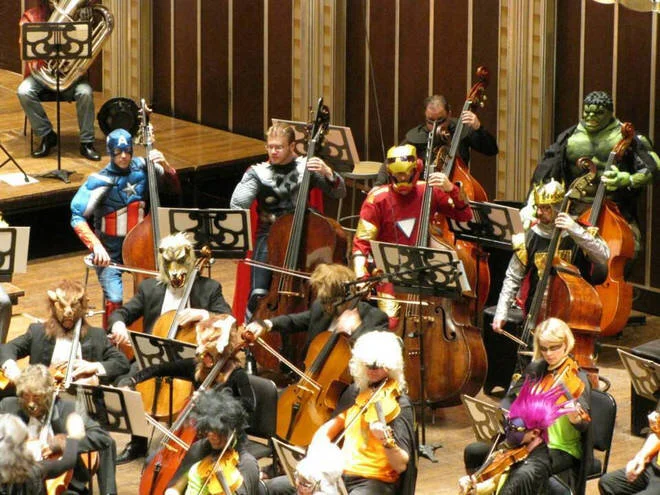TRADITIOOOOOOON
Our world - the Western European classical music world that is - is filled with various traditions. Orchestras dress in attire befitting the 19th century (or all black with all the extremities covered for femme folk), the conductor leaves the stage between pieces (same with performers of chamber or solo recitals), there is rarely talking, and the audience sits and is quiet. Don’t you DARE open that candy, Floyd!
Not now! Mozart 40 is on!
I’ve been ruminating on some of these traditions a lot today. Why do we do them? Why are these traditions so damn important? Why haven’t the greatest, most prominent organizations of Our World evolved past the 19th century?
I would love to see some of these traditions change and make us more approachable. Why do solo recitalists leave between pieces? You just received applause for the last piece and the audience is going to applaud that you came back? Traditioooooon!!!! But what if that soloist stayed on stage for the entire performance? Do you really need to hide offstage between pieces? Do you need to hydrate before continuing? Why not hydrate in front of the audience? Is that truly uncouth? As an audience member, I think I’d appreciate it if a soloist worked so hard on that performance that they needed some water. Even better, it’d be so humanizing if they accompanied that with a “Ooooof… that Paganini took it out of me… I need some water… How’s everyone doing? Enjoying things so far?”
Have you seen those Facebook pictures of orchestras all dressed up for Halloween? What makes those so delightfully fun for audiences is being able to see the personalities of the musicians. Audiences don’t get excited for an entire orchestra dressed in white tie and tails, but they definitely do when the bass section dresses as Marvel characters. Now, I get the tuxedo/all-black thing. The idea is to make everyone look fancy, but all the same so no one sticks out, thereby distracting the audience from the music. We can’t have the audience knowing that you’re an individual.
Bass Section! Assemble!
I’d love to see orchestras, recitalists, chamber ensembles etc - you know, those pillars of Western European Classical Music - look at a tradition and go “Nah. We’re not doing that anymore.”
And before you at me, I know there are small ensembles that are bucking tradition (have y’all heard of Invoke??), but they’re also not focusing on repertoire from the “traditional” canon. They’ve already said, “Nah” to those traditions. I would love to see a string quartet that specializes in freaking Beethoven and Haydn talk to the audience between movements, wear outfits that make some sort of statement, stay on stage and basically go against every tradition possible. (And maybe they could do some long over-due diversification of their programming and add Chevalier de Saint-Georges in there.)
He was massively important to the development of Western European Classical Music and I definitely had never heard of him until this year, because music history classes at conservatories are pretty white-washed until Joplin.
Wouldn’t that just be neat?
Right now, there isn’t too much difference between a recording and seeing it live except $20-$100 for the tickets to be in the room where it happens. It’s the humans playing the music that are making the live art and if we allow tradition to take most of or all their humanity out of the live performance, why pay the money? An innovative ensemble might make me like Beethoven string quartets if I felt like it was being performed by actual people with actual lives and opinions and feelings. Live performance should be about the living breathing performers in front of you and all the fun things that can happen in a live performance. Maybe bucking some long held traditions would help bring back the joy of live performance for audience members wishing to attend Western European Classical Music shows.
Also, we should call them “shows”, because “concerts” sound lame. And Intermission could be called Half-Time. (OMG what if there was a sports exhibition during intermission that’s in the middle of like a Mahler symphony or some shit? That would be awwwwwesome and I don’t even like sports!).
Also, also, this is why I’m calling it Western European Classical Music and not just “classical music”.


